Case Study: Euthanasia, ALS, and Christian Worldview Considerations
VerifiedAdded on 2022/11/28
|7
|2154
|386
Case Study
AI Summary
This case study delves into the complex issue of euthanasia through the lens of George, a successful attorney diagnosed with ALS, a progressive and degenerative disease. The assignment explores George's contemplation of assisted death due to his declining health and the absence of a cure, juxtaposing his personal desires with the Christian worldview, which generally opposes euthanasia. The case examines the ethical, legal, and religious considerations surrounding end-of-life decisions, including the role of palliative care and the importance of respecting individual choices while considering the broader societal implications. The study analyzes the conflict between George's suffering and the Christian belief in the sanctity of life, ultimately seeking to understand the multifaceted perspectives on euthanasia and assisted suicide, emphasizing the need for counseling and respecting George's autonomy in making his decision.
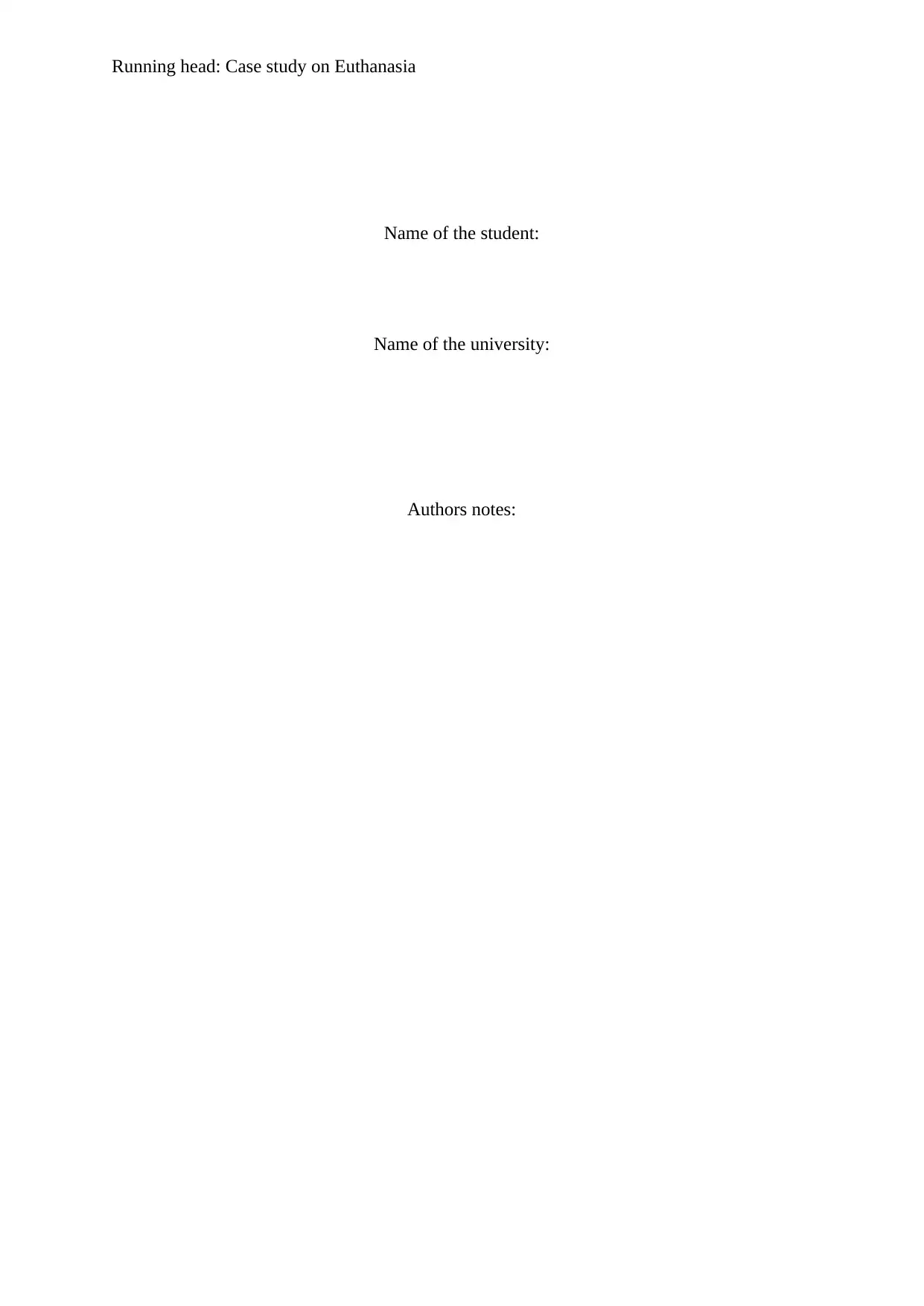
Running head: Case study on Euthanasia
Name of the student:
Name of the university:
Authors notes:
Name of the student:
Name of the university:
Authors notes:
Paraphrase This Document
Need a fresh take? Get an instant paraphrase of this document with our AI Paraphraser
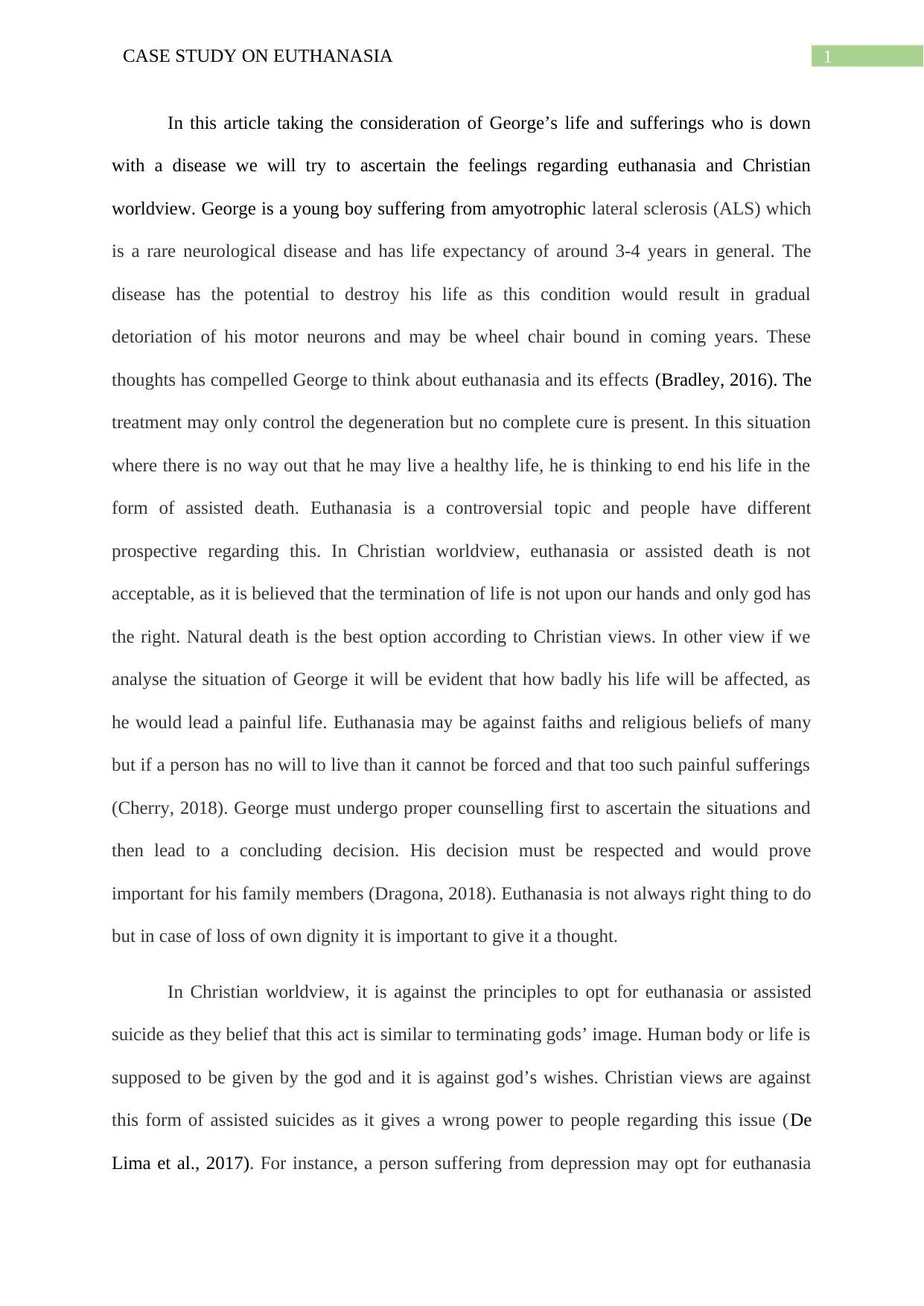
1CASE STUDY ON EUTHANASIA
In this article taking the consideration of George’s life and sufferings who is down
with a disease we will try to ascertain the feelings regarding euthanasia and Christian
worldview. George is a young boy suffering from amyotrophic lateral sclerosis (ALS) which
is a rare neurological disease and has life expectancy of around 3-4 years in general. The
disease has the potential to destroy his life as this condition would result in gradual
detoriation of his motor neurons and may be wheel chair bound in coming years. These
thoughts has compelled George to think about euthanasia and its effects (Bradley, 2016). The
treatment may only control the degeneration but no complete cure is present. In this situation
where there is no way out that he may live a healthy life, he is thinking to end his life in the
form of assisted death. Euthanasia is a controversial topic and people have different
prospective regarding this. In Christian worldview, euthanasia or assisted death is not
acceptable, as it is believed that the termination of life is not upon our hands and only god has
the right. Natural death is the best option according to Christian views. In other view if we
analyse the situation of George it will be evident that how badly his life will be affected, as
he would lead a painful life. Euthanasia may be against faiths and religious beliefs of many
but if a person has no will to live than it cannot be forced and that too such painful sufferings
(Cherry, 2018). George must undergo proper counselling first to ascertain the situations and
then lead to a concluding decision. His decision must be respected and would prove
important for his family members (Dragona, 2018). Euthanasia is not always right thing to do
but in case of loss of own dignity it is important to give it a thought.
In Christian worldview, it is against the principles to opt for euthanasia or assisted
suicide as they belief that this act is similar to terminating gods’ image. Human body or life is
supposed to be given by the god and it is against god’s wishes. Christian views are against
this form of assisted suicides as it gives a wrong power to people regarding this issue (De
Lima et al., 2017). For instance, a person suffering from depression may opt for euthanasia
In this article taking the consideration of George’s life and sufferings who is down
with a disease we will try to ascertain the feelings regarding euthanasia and Christian
worldview. George is a young boy suffering from amyotrophic lateral sclerosis (ALS) which
is a rare neurological disease and has life expectancy of around 3-4 years in general. The
disease has the potential to destroy his life as this condition would result in gradual
detoriation of his motor neurons and may be wheel chair bound in coming years. These
thoughts has compelled George to think about euthanasia and its effects (Bradley, 2016). The
treatment may only control the degeneration but no complete cure is present. In this situation
where there is no way out that he may live a healthy life, he is thinking to end his life in the
form of assisted death. Euthanasia is a controversial topic and people have different
prospective regarding this. In Christian worldview, euthanasia or assisted death is not
acceptable, as it is believed that the termination of life is not upon our hands and only god has
the right. Natural death is the best option according to Christian views. In other view if we
analyse the situation of George it will be evident that how badly his life will be affected, as
he would lead a painful life. Euthanasia may be against faiths and religious beliefs of many
but if a person has no will to live than it cannot be forced and that too such painful sufferings
(Cherry, 2018). George must undergo proper counselling first to ascertain the situations and
then lead to a concluding decision. His decision must be respected and would prove
important for his family members (Dragona, 2018). Euthanasia is not always right thing to do
but in case of loss of own dignity it is important to give it a thought.
In Christian worldview, it is against the principles to opt for euthanasia or assisted
suicide as they belief that this act is similar to terminating gods’ image. Human body or life is
supposed to be given by the god and it is against god’s wishes. Christian views are against
this form of assisted suicides as it gives a wrong power to people regarding this issue (De
Lima et al., 2017). For instance, a person suffering from depression may opt for euthanasia
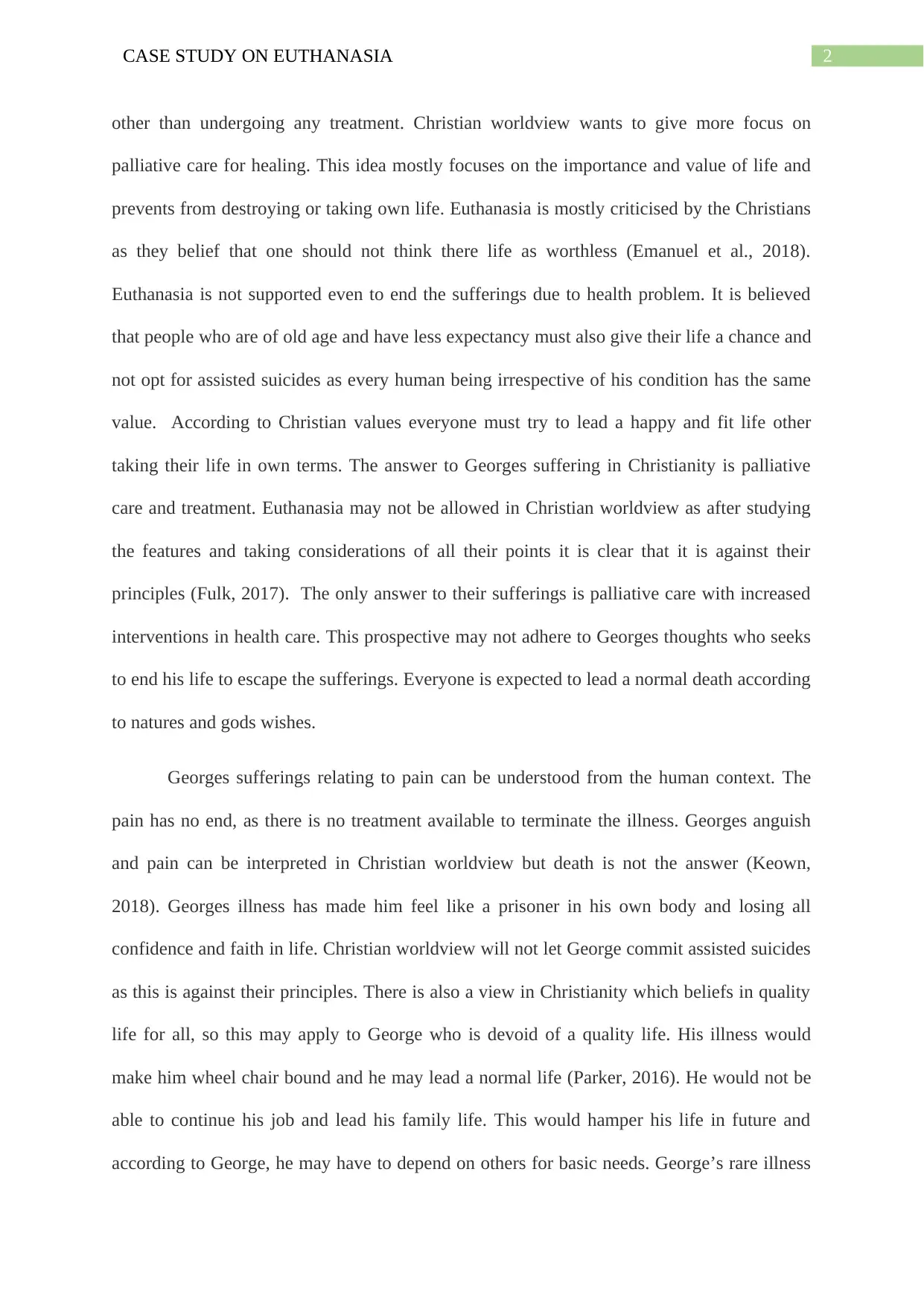
2CASE STUDY ON EUTHANASIA
other than undergoing any treatment. Christian worldview wants to give more focus on
palliative care for healing. This idea mostly focuses on the importance and value of life and
prevents from destroying or taking own life. Euthanasia is mostly criticised by the Christians
as they belief that one should not think there life as worthless (Emanuel et al., 2018).
Euthanasia is not supported even to end the sufferings due to health problem. It is believed
that people who are of old age and have less expectancy must also give their life a chance and
not opt for assisted suicides as every human being irrespective of his condition has the same
value. According to Christian values everyone must try to lead a happy and fit life other
taking their life in own terms. The answer to Georges suffering in Christianity is palliative
care and treatment. Euthanasia may not be allowed in Christian worldview as after studying
the features and taking considerations of all their points it is clear that it is against their
principles (Fulk, 2017). The only answer to their sufferings is palliative care with increased
interventions in health care. This prospective may not adhere to Georges thoughts who seeks
to end his life to escape the sufferings. Everyone is expected to lead a normal death according
to natures and gods wishes.
Georges sufferings relating to pain can be understood from the human context. The
pain has no end, as there is no treatment available to terminate the illness. Georges anguish
and pain can be interpreted in Christian worldview but death is not the answer (Keown,
2018). Georges illness has made him feel like a prisoner in his own body and losing all
confidence and faith in life. Christian worldview will not let George commit assisted suicides
as this is against their principles. There is also a view in Christianity which beliefs in quality
life for all, so this may apply to George who is devoid of a quality life. His illness would
make him wheel chair bound and he may lead a normal life (Parker, 2016). He would not be
able to continue his job and lead his family life. This would hamper his life in future and
according to George, he may have to depend on others for basic needs. George’s rare illness
other than undergoing any treatment. Christian worldview wants to give more focus on
palliative care for healing. This idea mostly focuses on the importance and value of life and
prevents from destroying or taking own life. Euthanasia is mostly criticised by the Christians
as they belief that one should not think there life as worthless (Emanuel et al., 2018).
Euthanasia is not supported even to end the sufferings due to health problem. It is believed
that people who are of old age and have less expectancy must also give their life a chance and
not opt for assisted suicides as every human being irrespective of his condition has the same
value. According to Christian values everyone must try to lead a happy and fit life other
taking their life in own terms. The answer to Georges suffering in Christianity is palliative
care and treatment. Euthanasia may not be allowed in Christian worldview as after studying
the features and taking considerations of all their points it is clear that it is against their
principles (Fulk, 2017). The only answer to their sufferings is palliative care with increased
interventions in health care. This prospective may not adhere to Georges thoughts who seeks
to end his life to escape the sufferings. Everyone is expected to lead a normal death according
to natures and gods wishes.
Georges sufferings relating to pain can be understood from the human context. The
pain has no end, as there is no treatment available to terminate the illness. Georges anguish
and pain can be interpreted in Christian worldview but death is not the answer (Keown,
2018). Georges illness has made him feel like a prisoner in his own body and losing all
confidence and faith in life. Christian worldview will not let George commit assisted suicides
as this is against their principles. There is also a view in Christianity which beliefs in quality
life for all, so this may apply to George who is devoid of a quality life. His illness would
make him wheel chair bound and he may lead a normal life (Parker, 2016). He would not be
able to continue his job and lead his family life. This would hamper his life in future and
according to George, he may have to depend on others for basic needs. George’s rare illness
⊘ This is a preview!⊘
Do you want full access?
Subscribe today to unlock all pages.

Trusted by 1+ million students worldwide
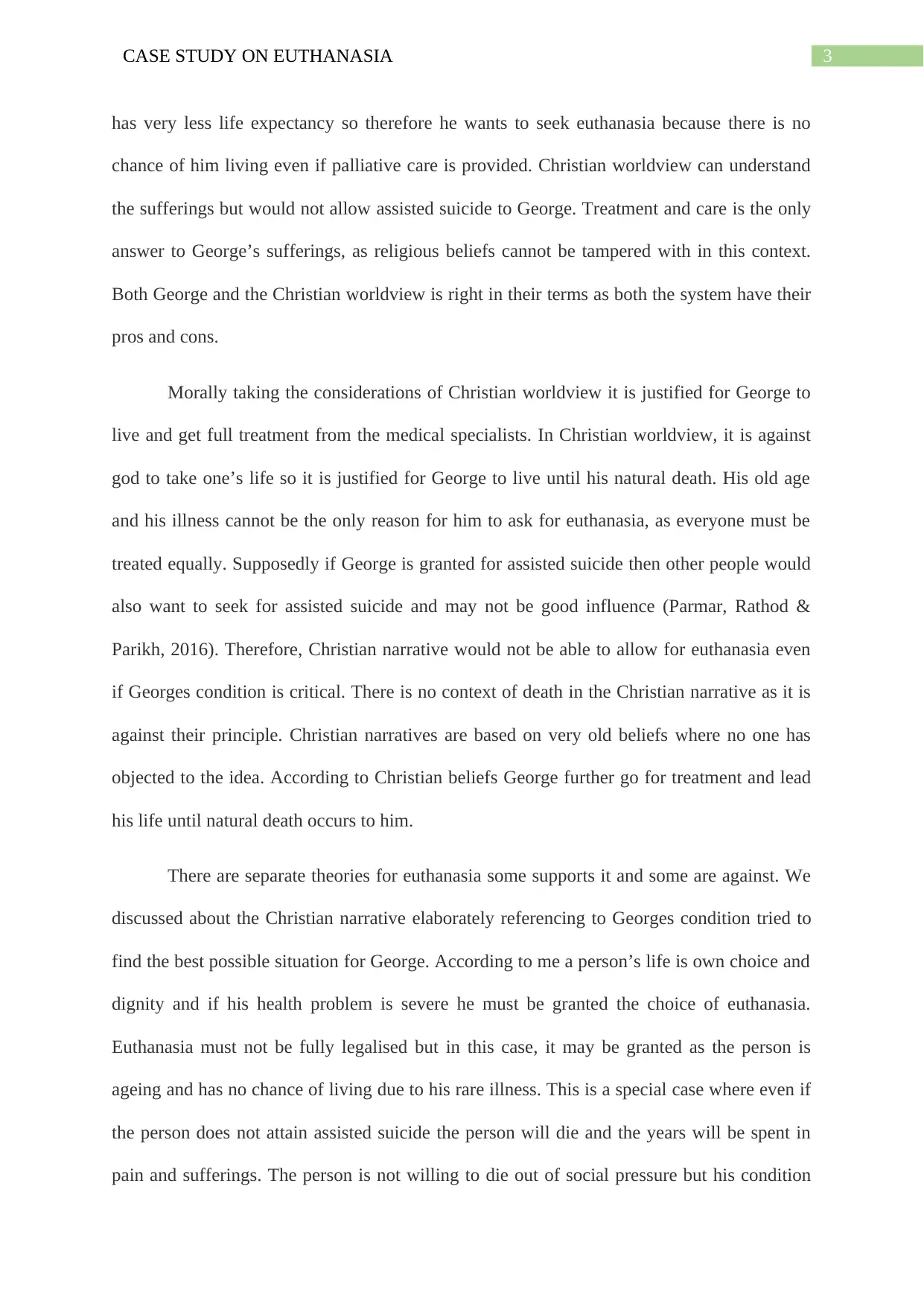
3CASE STUDY ON EUTHANASIA
has very less life expectancy so therefore he wants to seek euthanasia because there is no
chance of him living even if palliative care is provided. Christian worldview can understand
the sufferings but would not allow assisted suicide to George. Treatment and care is the only
answer to George’s sufferings, as religious beliefs cannot be tampered with in this context.
Both George and the Christian worldview is right in their terms as both the system have their
pros and cons.
Morally taking the considerations of Christian worldview it is justified for George to
live and get full treatment from the medical specialists. In Christian worldview, it is against
god to take one’s life so it is justified for George to live until his natural death. His old age
and his illness cannot be the only reason for him to ask for euthanasia, as everyone must be
treated equally. Supposedly if George is granted for assisted suicide then other people would
also want to seek for assisted suicide and may not be good influence (Parmar, Rathod &
Parikh, 2016). Therefore, Christian narrative would not be able to allow for euthanasia even
if Georges condition is critical. There is no context of death in the Christian narrative as it is
against their principle. Christian narratives are based on very old beliefs where no one has
objected to the idea. According to Christian beliefs George further go for treatment and lead
his life until natural death occurs to him.
There are separate theories for euthanasia some supports it and some are against. We
discussed about the Christian narrative elaborately referencing to Georges condition tried to
find the best possible situation for George. According to me a person’s life is own choice and
dignity and if his health problem is severe he must be granted the choice of euthanasia.
Euthanasia must not be fully legalised but in this case, it may be granted as the person is
ageing and has no chance of living due to his rare illness. This is a special case where even if
the person does not attain assisted suicide the person will die and the years will be spent in
pain and sufferings. The person is not willing to die out of social pressure but his condition
has very less life expectancy so therefore he wants to seek euthanasia because there is no
chance of him living even if palliative care is provided. Christian worldview can understand
the sufferings but would not allow assisted suicide to George. Treatment and care is the only
answer to George’s sufferings, as religious beliefs cannot be tampered with in this context.
Both George and the Christian worldview is right in their terms as both the system have their
pros and cons.
Morally taking the considerations of Christian worldview it is justified for George to
live and get full treatment from the medical specialists. In Christian worldview, it is against
god to take one’s life so it is justified for George to live until his natural death. His old age
and his illness cannot be the only reason for him to ask for euthanasia, as everyone must be
treated equally. Supposedly if George is granted for assisted suicide then other people would
also want to seek for assisted suicide and may not be good influence (Parmar, Rathod &
Parikh, 2016). Therefore, Christian narrative would not be able to allow for euthanasia even
if Georges condition is critical. There is no context of death in the Christian narrative as it is
against their principle. Christian narratives are based on very old beliefs where no one has
objected to the idea. According to Christian beliefs George further go for treatment and lead
his life until natural death occurs to him.
There are separate theories for euthanasia some supports it and some are against. We
discussed about the Christian narrative elaborately referencing to Georges condition tried to
find the best possible situation for George. According to me a person’s life is own choice and
dignity and if his health problem is severe he must be granted the choice of euthanasia.
Euthanasia must not be fully legalised but in this case, it may be granted as the person is
ageing and has no chance of living due to his rare illness. This is a special case where even if
the person does not attain assisted suicide the person will die and the years will be spent in
pain and sufferings. The person is not willing to die out of social pressure but his condition
Paraphrase This Document
Need a fresh take? Get an instant paraphrase of this document with our AI Paraphraser
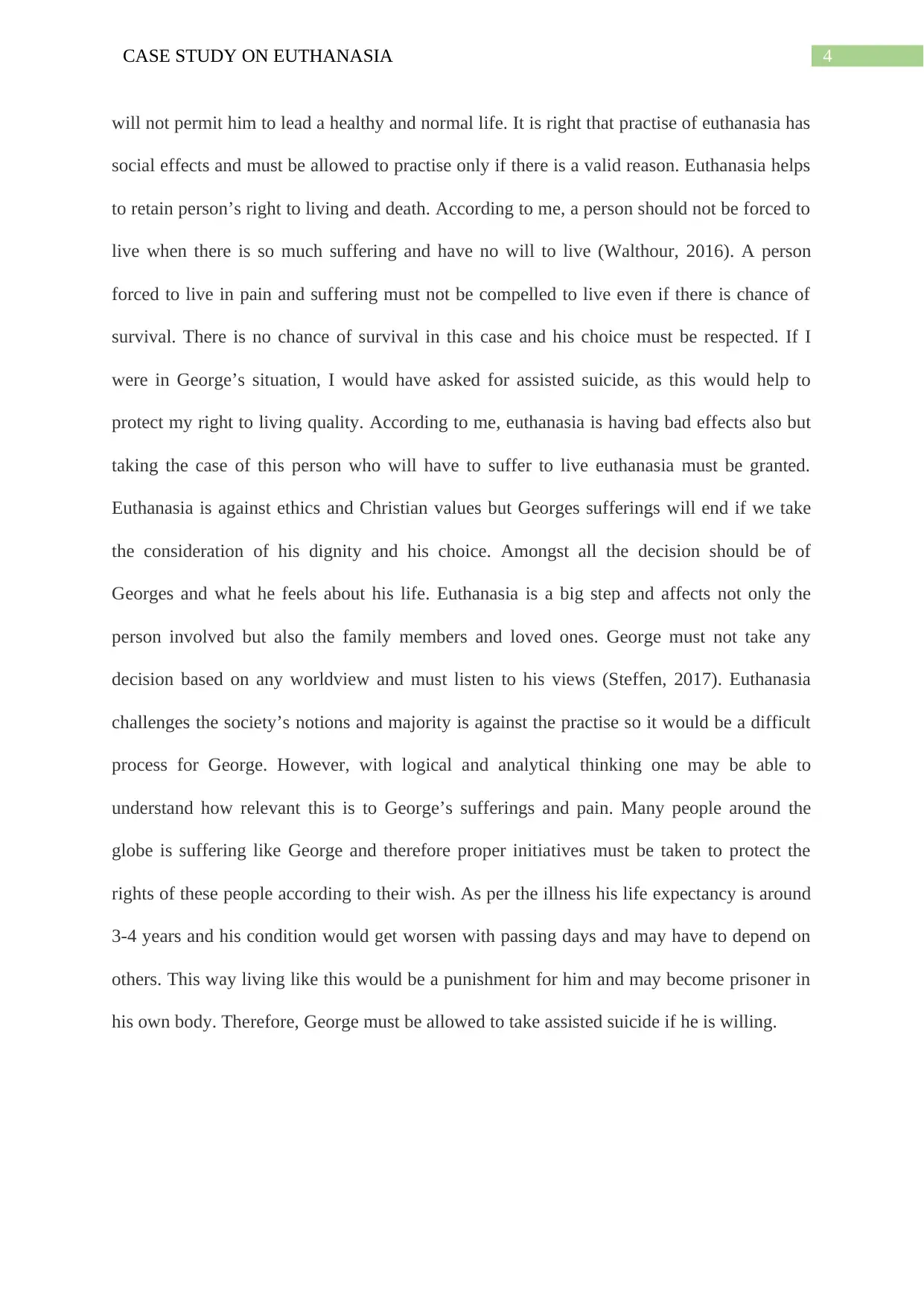
4CASE STUDY ON EUTHANASIA
will not permit him to lead a healthy and normal life. It is right that practise of euthanasia has
social effects and must be allowed to practise only if there is a valid reason. Euthanasia helps
to retain person’s right to living and death. According to me, a person should not be forced to
live when there is so much suffering and have no will to live (Walthour, 2016). A person
forced to live in pain and suffering must not be compelled to live even if there is chance of
survival. There is no chance of survival in this case and his choice must be respected. If I
were in George’s situation, I would have asked for assisted suicide, as this would help to
protect my right to living quality. According to me, euthanasia is having bad effects also but
taking the case of this person who will have to suffer to live euthanasia must be granted.
Euthanasia is against ethics and Christian values but Georges sufferings will end if we take
the consideration of his dignity and his choice. Amongst all the decision should be of
Georges and what he feels about his life. Euthanasia is a big step and affects not only the
person involved but also the family members and loved ones. George must not take any
decision based on any worldview and must listen to his views (Steffen, 2017). Euthanasia
challenges the society’s notions and majority is against the practise so it would be a difficult
process for George. However, with logical and analytical thinking one may be able to
understand how relevant this is to George’s sufferings and pain. Many people around the
globe is suffering like George and therefore proper initiatives must be taken to protect the
rights of these people according to their wish. As per the illness his life expectancy is around
3-4 years and his condition would get worsen with passing days and may have to depend on
others. This way living like this would be a punishment for him and may become prisoner in
his own body. Therefore, George must be allowed to take assisted suicide if he is willing.
will not permit him to lead a healthy and normal life. It is right that practise of euthanasia has
social effects and must be allowed to practise only if there is a valid reason. Euthanasia helps
to retain person’s right to living and death. According to me, a person should not be forced to
live when there is so much suffering and have no will to live (Walthour, 2016). A person
forced to live in pain and suffering must not be compelled to live even if there is chance of
survival. There is no chance of survival in this case and his choice must be respected. If I
were in George’s situation, I would have asked for assisted suicide, as this would help to
protect my right to living quality. According to me, euthanasia is having bad effects also but
taking the case of this person who will have to suffer to live euthanasia must be granted.
Euthanasia is against ethics and Christian values but Georges sufferings will end if we take
the consideration of his dignity and his choice. Amongst all the decision should be of
Georges and what he feels about his life. Euthanasia is a big step and affects not only the
person involved but also the family members and loved ones. George must not take any
decision based on any worldview and must listen to his views (Steffen, 2017). Euthanasia
challenges the society’s notions and majority is against the practise so it would be a difficult
process for George. However, with logical and analytical thinking one may be able to
understand how relevant this is to George’s sufferings and pain. Many people around the
globe is suffering like George and therefore proper initiatives must be taken to protect the
rights of these people according to their wish. As per the illness his life expectancy is around
3-4 years and his condition would get worsen with passing days and may have to depend on
others. This way living like this would be a punishment for him and may become prisoner in
his own body. Therefore, George must be allowed to take assisted suicide if he is willing.
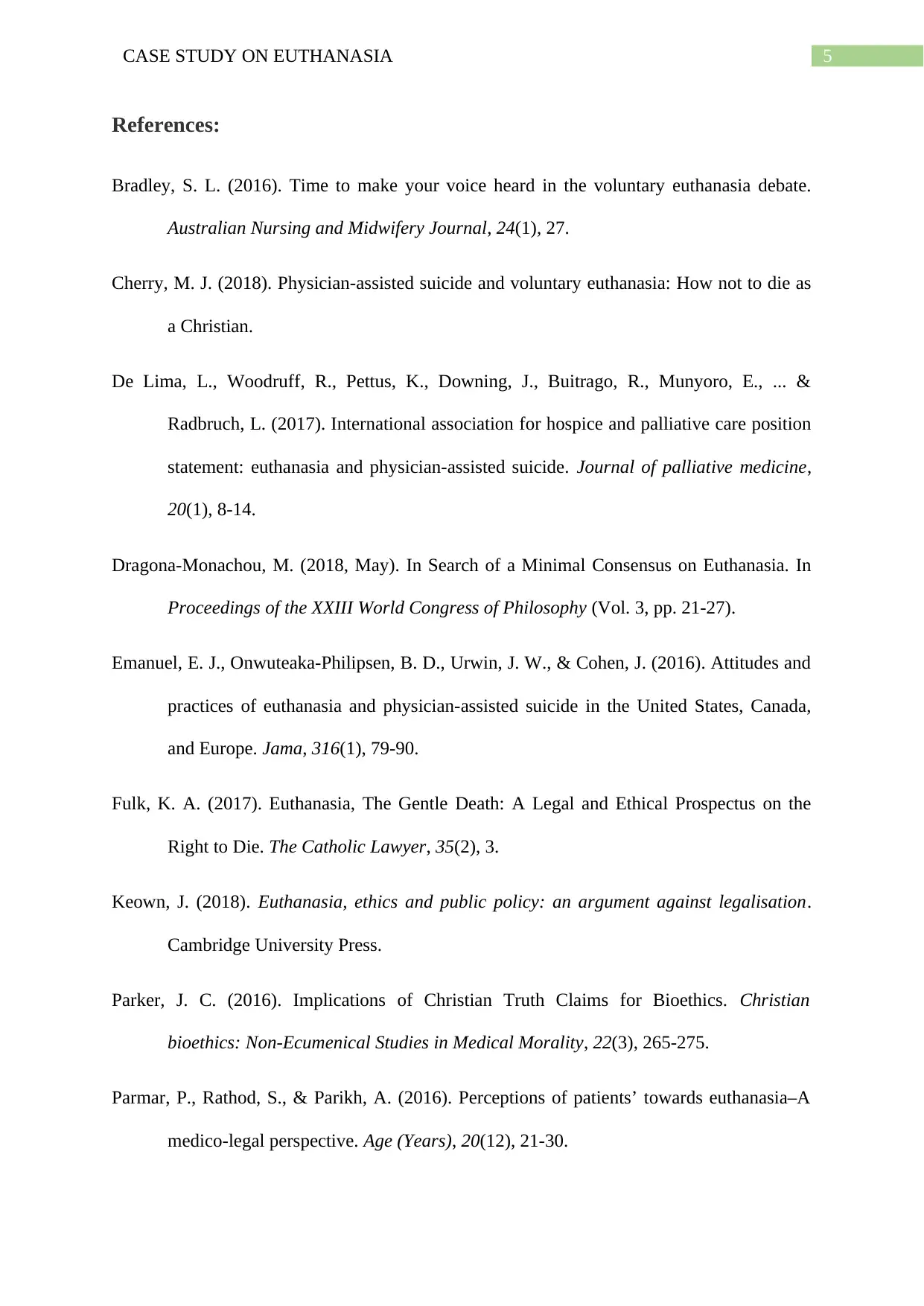
5CASE STUDY ON EUTHANASIA
References:
Bradley, S. L. (2016). Time to make your voice heard in the voluntary euthanasia debate.
Australian Nursing and Midwifery Journal, 24(1), 27.
Cherry, M. J. (2018). Physician-assisted suicide and voluntary euthanasia: How not to die as
a Christian.
De Lima, L., Woodruff, R., Pettus, K., Downing, J., Buitrago, R., Munyoro, E., ... &
Radbruch, L. (2017). International association for hospice and palliative care position
statement: euthanasia and physician-assisted suicide. Journal of palliative medicine,
20(1), 8-14.
Dragona-Monachou, M. (2018, May). In Search of a Minimal Consensus on Euthanasia. In
Proceedings of the XXIII World Congress of Philosophy (Vol. 3, pp. 21-27).
Emanuel, E. J., Onwuteaka-Philipsen, B. D., Urwin, J. W., & Cohen, J. (2016). Attitudes and
practices of euthanasia and physician-assisted suicide in the United States, Canada,
and Europe. Jama, 316(1), 79-90.
Fulk, K. A. (2017). Euthanasia, The Gentle Death: A Legal and Ethical Prospectus on the
Right to Die. The Catholic Lawyer, 35(2), 3.
Keown, J. (2018). Euthanasia, ethics and public policy: an argument against legalisation.
Cambridge University Press.
Parker, J. C. (2016). Implications of Christian Truth Claims for Bioethics. Christian
bioethics: Non-Ecumenical Studies in Medical Morality, 22(3), 265-275.
Parmar, P., Rathod, S., & Parikh, A. (2016). Perceptions of patients’ towards euthanasia–A
medico-legal perspective. Age (Years), 20(12), 21-30.
References:
Bradley, S. L. (2016). Time to make your voice heard in the voluntary euthanasia debate.
Australian Nursing and Midwifery Journal, 24(1), 27.
Cherry, M. J. (2018). Physician-assisted suicide and voluntary euthanasia: How not to die as
a Christian.
De Lima, L., Woodruff, R., Pettus, K., Downing, J., Buitrago, R., Munyoro, E., ... &
Radbruch, L. (2017). International association for hospice and palliative care position
statement: euthanasia and physician-assisted suicide. Journal of palliative medicine,
20(1), 8-14.
Dragona-Monachou, M. (2018, May). In Search of a Minimal Consensus on Euthanasia. In
Proceedings of the XXIII World Congress of Philosophy (Vol. 3, pp. 21-27).
Emanuel, E. J., Onwuteaka-Philipsen, B. D., Urwin, J. W., & Cohen, J. (2016). Attitudes and
practices of euthanasia and physician-assisted suicide in the United States, Canada,
and Europe. Jama, 316(1), 79-90.
Fulk, K. A. (2017). Euthanasia, The Gentle Death: A Legal and Ethical Prospectus on the
Right to Die. The Catholic Lawyer, 35(2), 3.
Keown, J. (2018). Euthanasia, ethics and public policy: an argument against legalisation.
Cambridge University Press.
Parker, J. C. (2016). Implications of Christian Truth Claims for Bioethics. Christian
bioethics: Non-Ecumenical Studies in Medical Morality, 22(3), 265-275.
Parmar, P., Rathod, S., & Parikh, A. (2016). Perceptions of patients’ towards euthanasia–A
medico-legal perspective. Age (Years), 20(12), 21-30.
⊘ This is a preview!⊘
Do you want full access?
Subscribe today to unlock all pages.

Trusted by 1+ million students worldwide
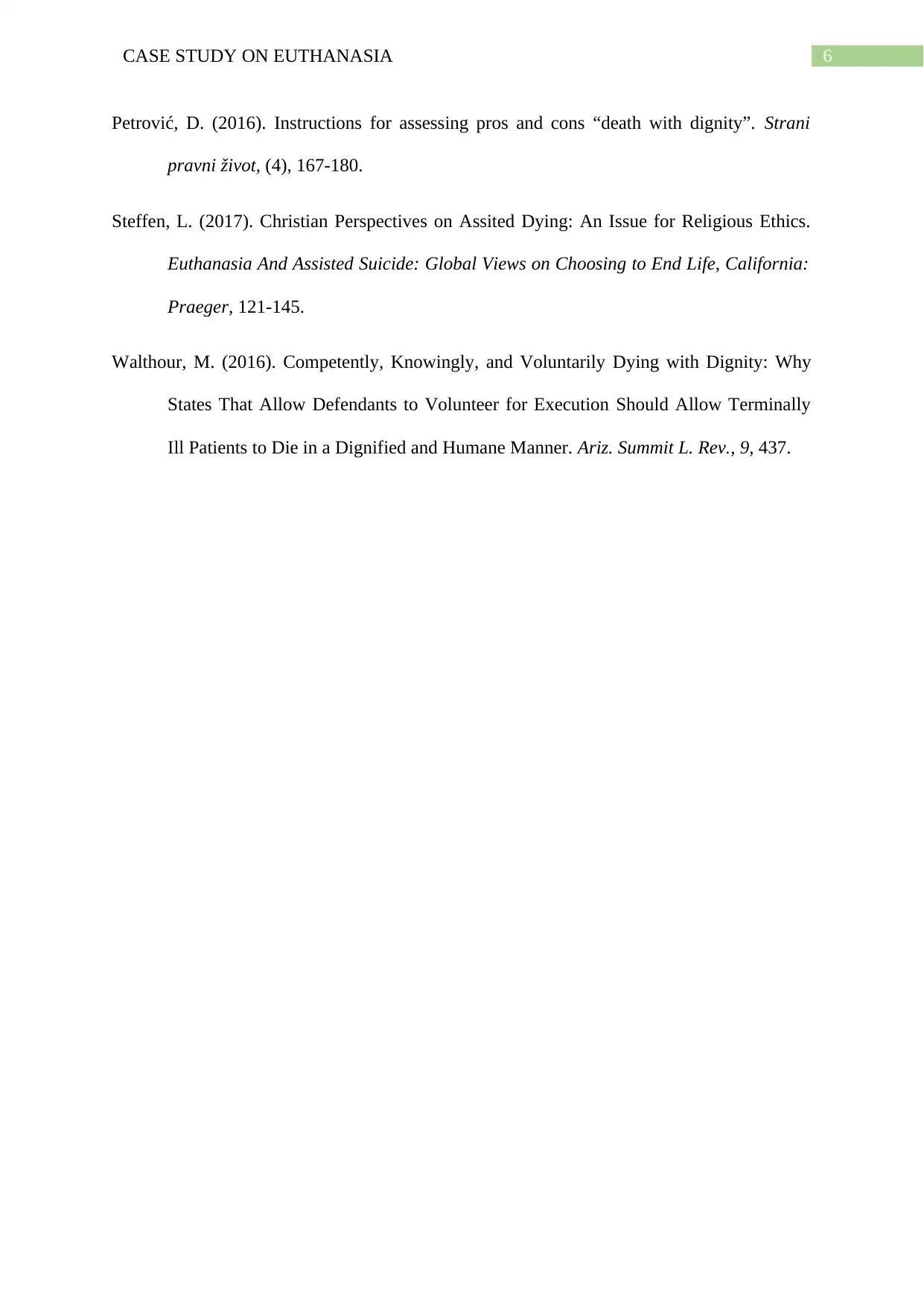
6CASE STUDY ON EUTHANASIA
Petrović, D. (2016). Instructions for assessing pros and cons “death with dignity”. Strani
pravni život, (4), 167-180.
Steffen, L. (2017). Christian Perspectives on Assited Dying: An Issue for Religious Ethics.
Euthanasia And Assisted Suicide: Global Views on Choosing to End Life, California:
Praeger, 121-145.
Walthour, M. (2016). Competently, Knowingly, and Voluntarily Dying with Dignity: Why
States That Allow Defendants to Volunteer for Execution Should Allow Terminally
Ill Patients to Die in a Dignified and Humane Manner. Ariz. Summit L. Rev., 9, 437.
Petrović, D. (2016). Instructions for assessing pros and cons “death with dignity”. Strani
pravni život, (4), 167-180.
Steffen, L. (2017). Christian Perspectives on Assited Dying: An Issue for Religious Ethics.
Euthanasia And Assisted Suicide: Global Views on Choosing to End Life, California:
Praeger, 121-145.
Walthour, M. (2016). Competently, Knowingly, and Voluntarily Dying with Dignity: Why
States That Allow Defendants to Volunteer for Execution Should Allow Terminally
Ill Patients to Die in a Dignified and Humane Manner. Ariz. Summit L. Rev., 9, 437.
1 out of 7
Related Documents
Your All-in-One AI-Powered Toolkit for Academic Success.
+13062052269
info@desklib.com
Available 24*7 on WhatsApp / Email
![[object Object]](/_next/static/media/star-bottom.7253800d.svg)
Unlock your academic potential
Copyright © 2020–2026 A2Z Services. All Rights Reserved. Developed and managed by ZUCOL.





